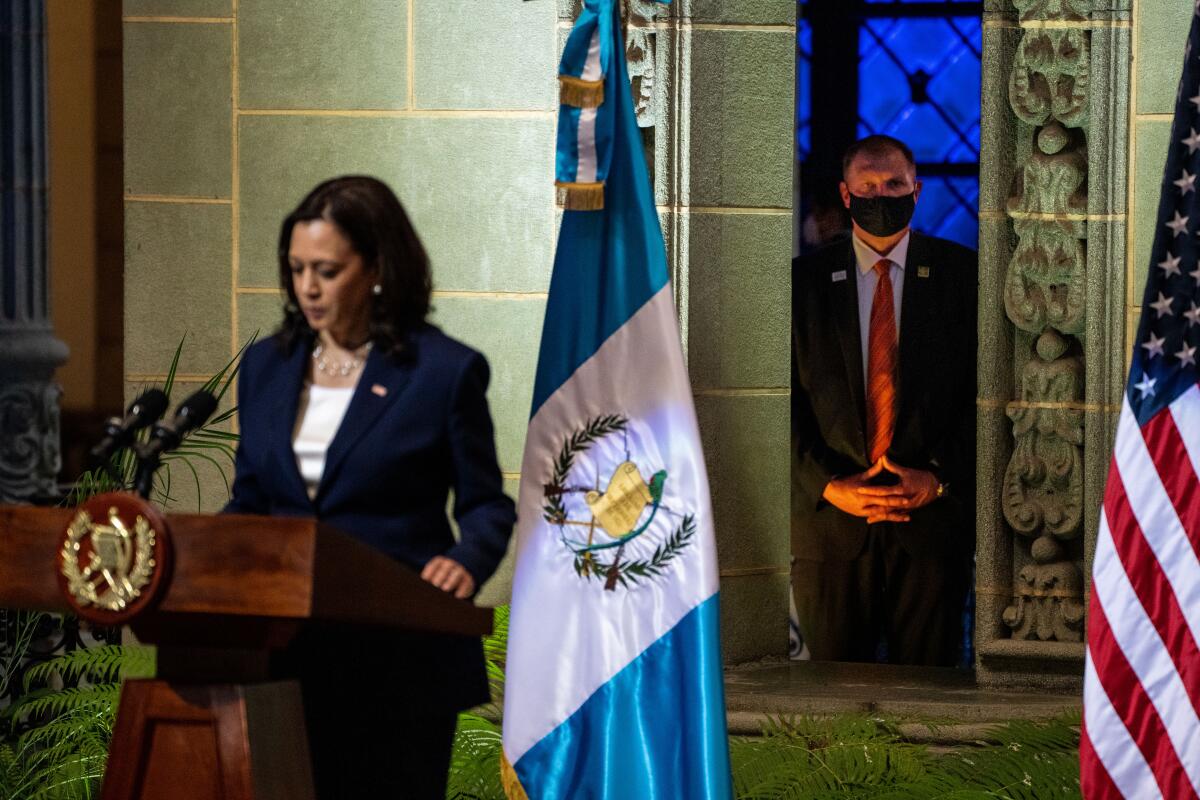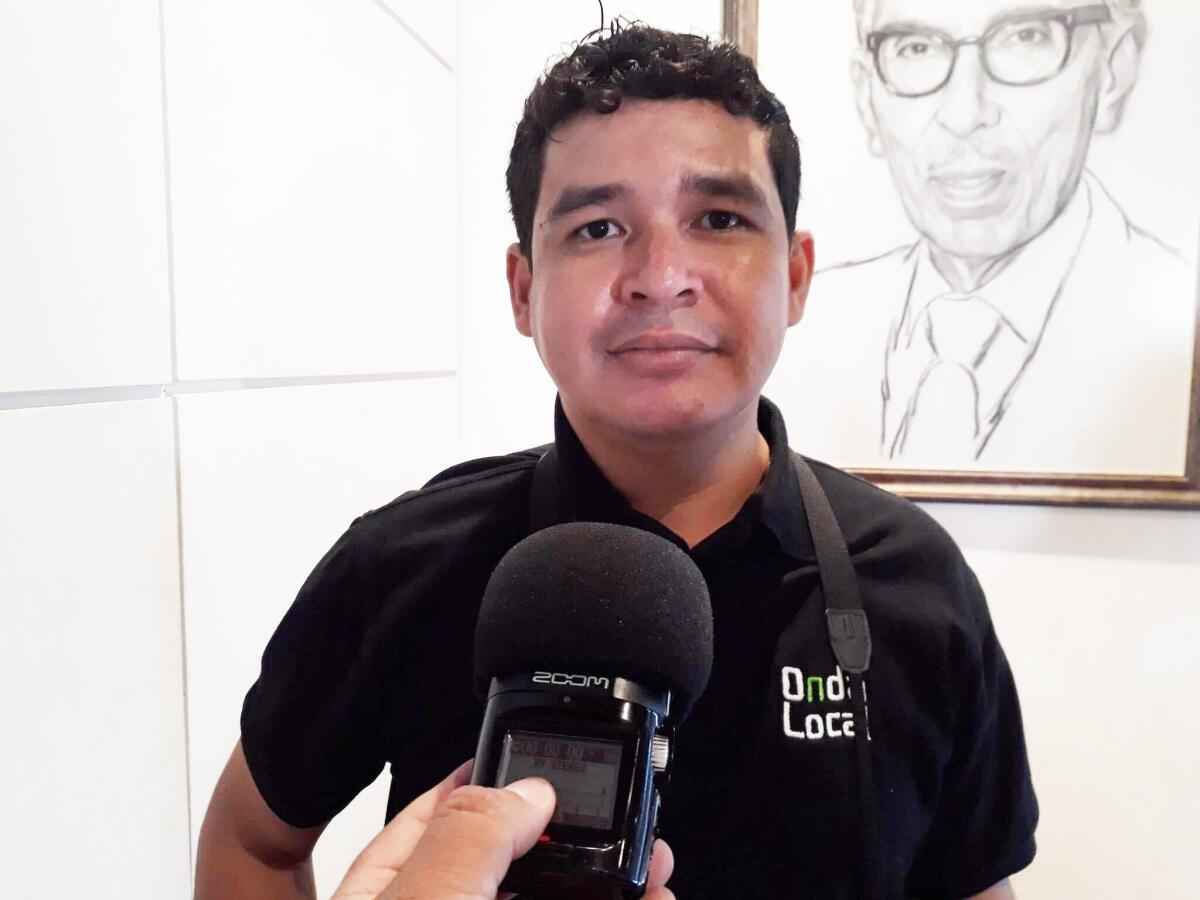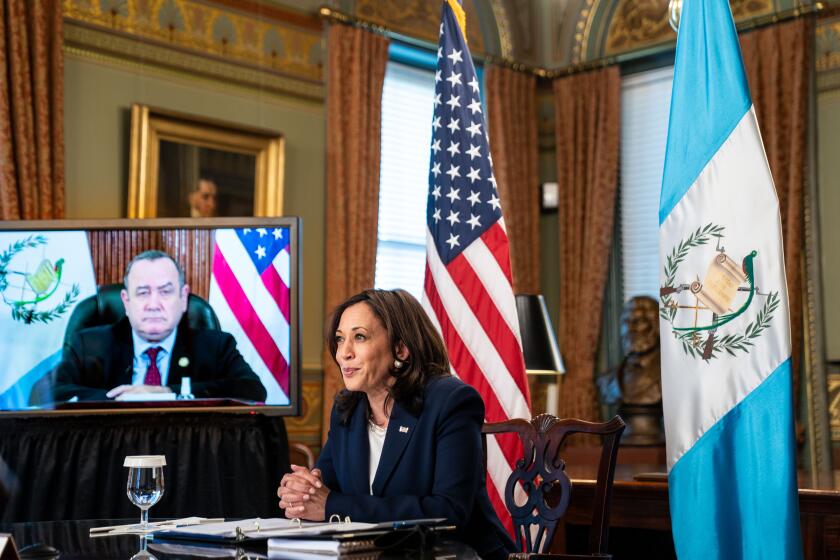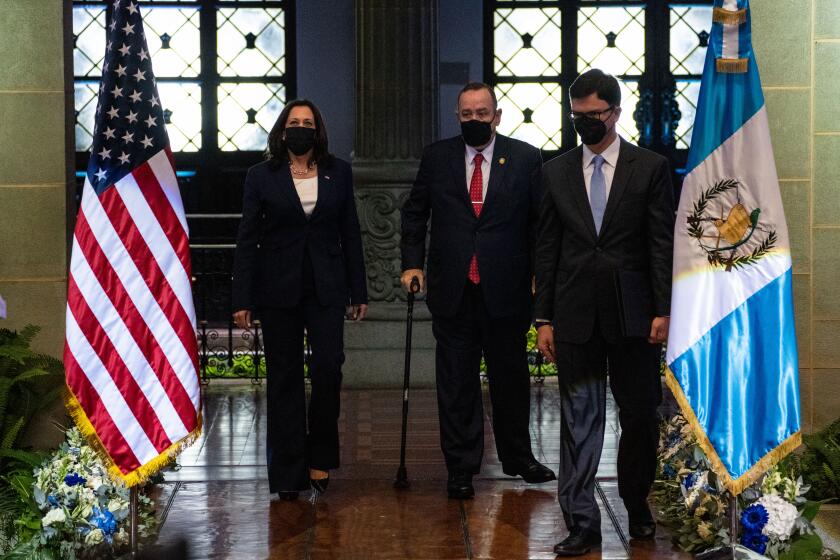New laws in Central America are upending Biden’s fight against corruption

- Share via
WASHINGTON — Journalist Julio López says he endured years of harassment and violence by the Nicaraguan government and its supporters for his investigative reporting on corruption and human rights. But in April 2018, the repression took a darker turn.
Pro-government activists stole his cellphone and beat him unconscious while he was covering a protest.
Threats and surveillance escalated until last June, when police issued an order restricting his ability to travel. López fled to Costa Rica. His outlet, Onda Local, still has a handful of reporters in Nicaragua. But López doesn’t know how much longer it can continue to operate.

“I’d prefer to be in my country doing my job,” he said. “But the circumstances force you to leave. Returning to Nicaragua, for now, isn’t possible.”
The crackdown on journalists is part of a recent effort across the region aimed at nongovernmental organizations such as Onda, which receive funding from international sources to help in missions that include battling corruption, alleviating poverty and otherwise improving the civic life in their countries. Onda had received money from a local foundation funded in part by the U.S. and European Union agencies for international development.
Experts say the foreign agent laws of Central America undermine the Biden administration’s strategy to work with these groups to reduce the underlying causes of migration. The crackdown, they warn, can harm the stability of communities and scare off foreign investment. Administration officials acknowledge the setback and agree it could ultimately lead to an increase in migration to the southern U.S. border.
In January, Nicaragua implemented its foreign agents law, targeting groups deemed by President Daniel Ortega’s government to threaten the “security of the nation” by requiring organizations with ties to international institutions to register with the Interior Ministry and provide monthly income and spending plans — or face closure, criminal prosecution and fines of up to $500,000.
Other Central American countries, including Guatemala and Honduras, have recently passed similar laws. El Salvador could soon implement the most restrictive version in the region, including a 40% tax on funds from foreign sources.
The laws offer governments of those countries more power to monitor and control businesses, organizations and people receiving international funding. With the stated goal of rooting out alleged security threats, the regulations prevent registered “foreign agents” from carrying out activities considered political.
Vice President Kamala Harris plans to announce $540 million in private investments in Central America aimed at reducing migration from the region.
But these governments take a broad view of what falls under political activities. That puts work, including assistance for people with HIV and AIDS, access to contraceptives and abortion, and the rights of gay, lesbian, bisexual, transgender and queer people at risk. Many groups also provide food and clean water to the poorest residents.
Governments in Central America, as well as in other regions, including Russia and Israel, have cited the U.S.’ foreign agent law as justification for their own more restrictive versions. The Foreign Agents Registration Act was passed in 1938 to counter Nazi propaganda and, later, lobbying and interference in elections from foreign governments. Its broad language has also at times swept up organizations having nothing to do with political lobbying and led to calls for reform.
FARA seeks transparency by requiring lobbyists from other countries to register as foreign agents while allowing their work to influence U.S. policy. The Central American laws go much further.
The Biden administration’s root causes strategy uses partnerships with other governments, international institutions, businesses, foundations and civic groups, according to the detailed White House report, to “build hope for citizens in the region that the life they desire can be found at home.” Officials hope that by also targeting corruption, they can create better conditions for people to get jobs and go to school.
But because those governments are recognized internationally for corruption, much of the humanitarian work to combat poverty and improve communities comes from international organizations. The U.S. strategy requires a balance between fighting corruption and convincing those same leaders to better secure their borders.
Nearly two-thirds of Customs and Border Protection stops last fiscal year involved people from countries other than Mexico — the highest total for non-Mexican citizens in CBP records dating back 20 years. Most involved people from the Northern Triangle countries of El Salvador, Guatemala and Honduras. Border agents also encountered nearly 51,000 Nicaraguans in fiscal year 2021, compared with just over 14,000 encounters in 2019.
Ricardo Zúñiga, special envoy for the Northern Triangle region, called the registration laws a significant concern, with neighboring Nicaragua’s being the most severe example.
In an interview with The Times, Zúñiga said there’s a difference between lobbying on behalf of a foreign government and being the Red Cross or the American Civil Liberties Union and receiving funding from overseas donors.
“That’s not subversion,” he said, arguing that the laws treat media and nonprofits “as somehow enemies of the state, when in fact what they’re doing is normal civic activity.”
Improving confidence in these governments is at the heart of the administration’s strategy, Zúñiga said.
“The only thing that’s going to really resolve migration pressure towards Mexico and towards the United States is creation of jobs and hope in Central America,” he said. “And there’s no way you can separate out governance from economic growth, because the No. 1 thing we hear from companies is they’re worried about investing in Central America.”
Kamala Harris was asked to find ways to slow migration from and curb corruption in Central America. But it could take years.
In Nicaragua, Sandinista lawmaker Wálmaro Gutiérrez, who pushed for the foreign agents law, called government opponents a “pack of delinquents” and said the law “is in legitimate defense of the right of the sovereignty of the nation.”
The government of El Salvador has said the proposed law is necessary to promote transparency and prevent foreign meddling. President Nayib Bukele recently criticized the United States for giving $310 million to nongovernmental organizations in the Northern Triangle. “What would the United States government say if we financed its political opposition? Because that’s what these NGOs do, and everyone knows that,” he tweeted.
Eric Olson, research director for the Seattle Foundation, which gives grants in Central America, said autocrats in the region like to harken to the history of U.S.-backed groups seeking to counter the Soviet influence to taint the work of current groups decades later.
“The vast majority of organizations have certainly been independent from the intelligence community of the United States,” said Olson, whose nonprofit works with other groups in the region but does not get U.S. government money. But Central American governments, he said, have played on the history of U.S. involvement in the region to justify their actions.
Manfredo Marroquín, director of Acción Ciudadana in Guatemala, a chapter of the anti-corruption organization Transparency International, said his sister organization in El Salvador is already feeling the chilling effect of recent government raids on similar groups and is considering moving its staffers out of the country.
Groups in Guatemala have a February deadline to register and comply with other aspects of that country’s law, said Marroquín, whose group monitors elections, promotes citizen participation in government and helps people report corruption. But he is already concerned that it could create problems. If the Guatemalan government takes a heavy hand, he fears groups like his “will be less aggressive or more conservative in their actions, especially related to government,” he said.
Marroquín, who was part of a group of activists and civic leaders who met with Vice President Kamala Harris when she visited Guatemala in June, said he believes leaders in his region are not only ignoring American pleas for democratic values but thumbing their nose at them. In July, just weeks after Harris visited with a message to preserve anti-corruption efforts, Guatemala’s attorney general fired the leading anti-corruption prosecutor, who has since fled to the United States with evidence that he claims implicates President Alejandro Giammattei.
The global nonprofit Oxfam, which seeks to reduce poverty, was among several in August that had their permits revoked and were given 72 hours to shut down operations and leave Nicaragua. Central America director Ana María Méndez said she’s not opposed to accountability and transparency. But she said “there is a clear intentionality and selectivity about who they are going after.” She is now concerned about local partners and other organizations in the Northern Triangle region.
With fewer organizations able to combat poverty, Méndez said, more Central Americans will flee.
“When you have absolutely no option and you see your kids starving, you go the next day,” she said. “Because you’re very desperate.”
More to Read
Get the L.A. Times Politics newsletter
Deeply reported insights into legislation, politics and policy from Sacramento, Washington and beyond. In your inbox twice per week.
You may occasionally receive promotional content from the Los Angeles Times.













